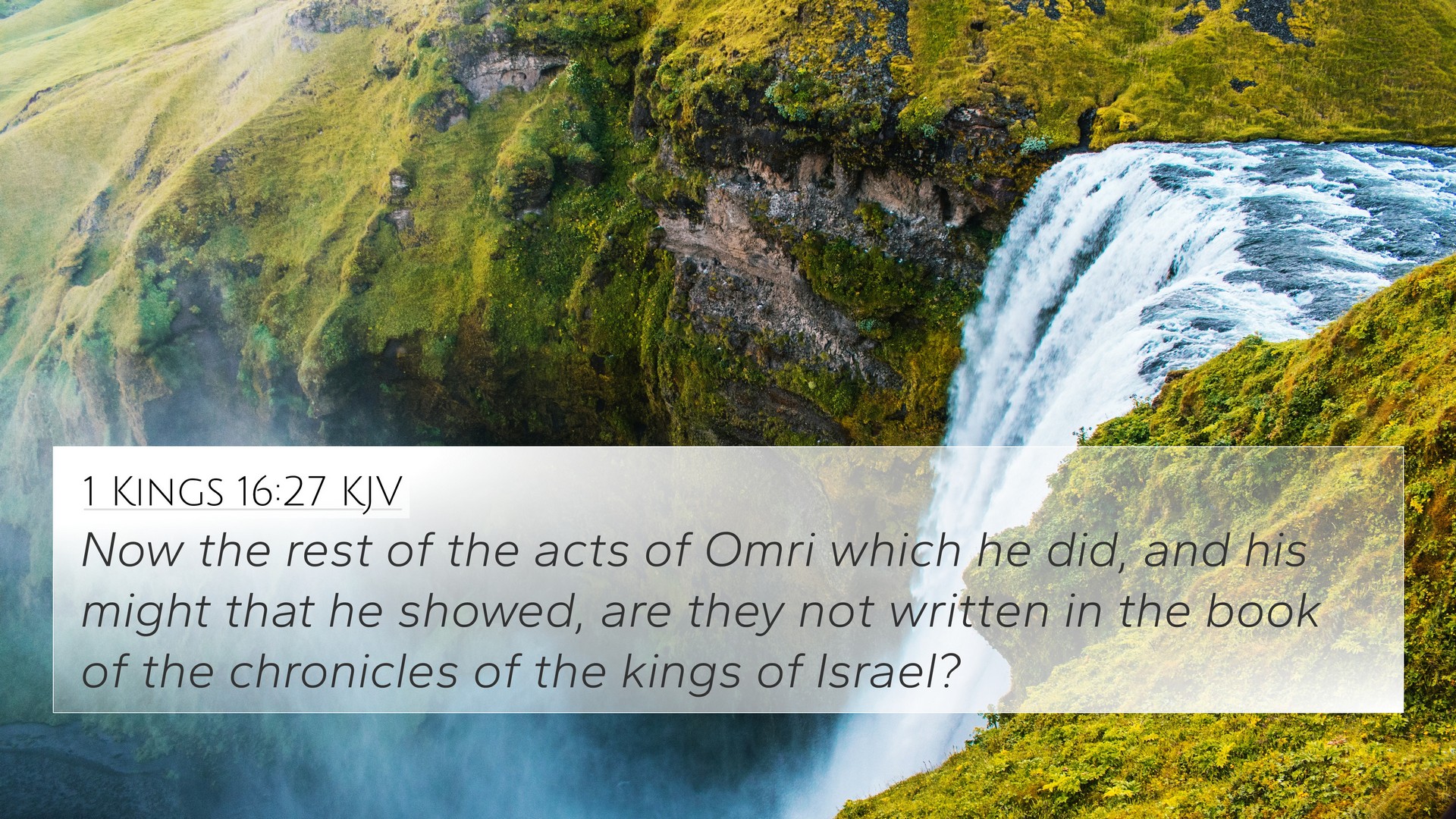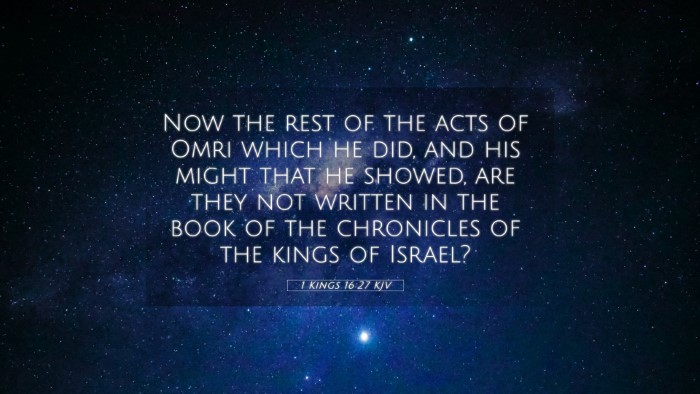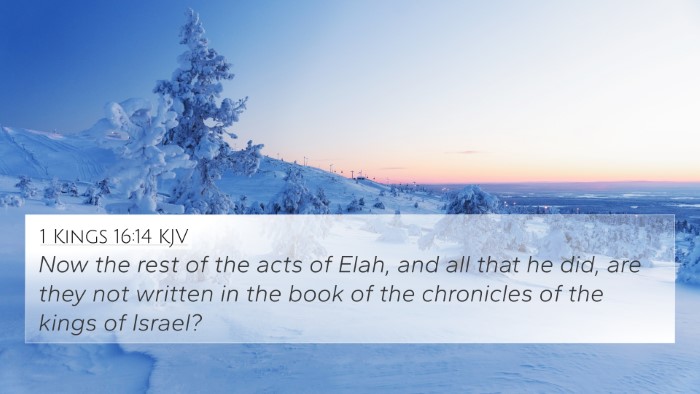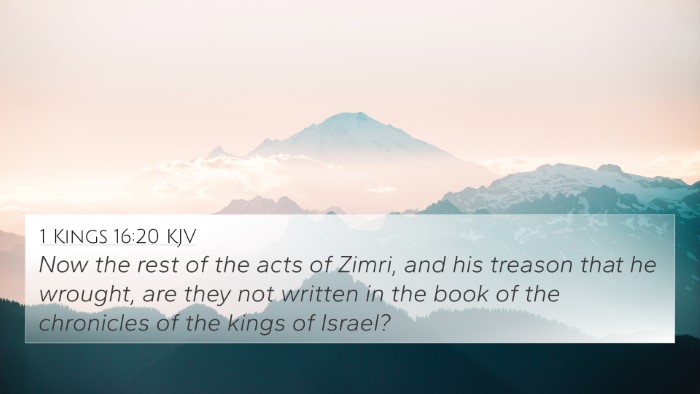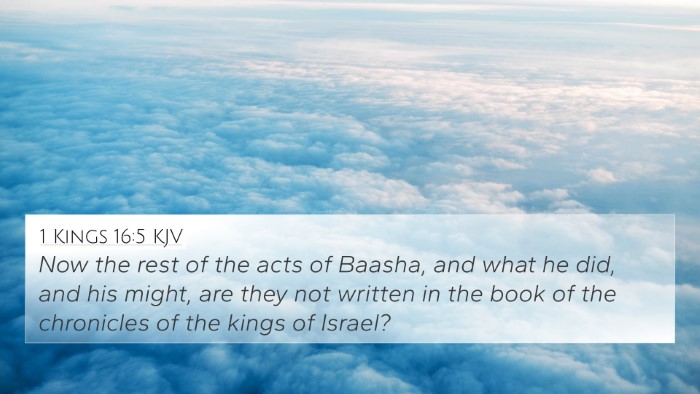Understanding 1 Kings 16:27
1 Kings 16:27 states: "And the rest of the acts of Omri, which he did, and his might that he shewed, are they not written in the book of the chronicles of the kings of Israel?" This verse serves as a concluding remark about King Omri's reign, indicating that additional information about his actions and achievements can be found in the historical records known as the Chronicles.
Summary of Key Insights
The significance of this verse lies in its function within the narrative of the Kings' historiography. It emphasizes:
- The Historical Context: Omri was a significant figure in Israel's monarchy, known for consolidating power and establishing a dynasty.
- Chronicles as a Resource: The reference to other historical records underscores the value of historical context in understanding Biblical events and leadership.
- Divine Sovereignty: This brief mention reflects God's sovereignty in choosing leaders and the unfolding of His plans through them, despite their imperfections.
Commentary Insights
Matthew Henry's Commentary
Henry points out that Omri's military exploits and political strategies were influential. He underlines the importance of the Chronicles, hinting that they provide a fuller account of Israel’s political history and leadership qualities.
Albert Barnes' Commentary
Barnes emphasizes the impact of Omri’s reign on the northern kingdom of Israel, illustrating how the political maneuvers and decisions affected the nation's trajectory. He notes the significance of Omri’s legacy, suggesting that his actions laid the groundwork for future kings.
Adam Clarke's Commentary
Clarke adds that the verse reflects the general pattern in the books of Kings where the details of each king's reign are recorded in a systematic manner, thus promoting the understanding of their contributions and failures in the context of Israel’s faithfulness to God.
Cross-References to 1 Kings 16:27
- 1 Kings 16:23: Provides context regarding the establishment of Omri’s reign.
- 1 Kings 16:28: Describes the end of Omri's rule.
- 2 Chronicles 22:7: Offers insight on the historical accounts of kings.
- Micah 6:16: Reflects the moral failings of Israel's kings, including Omri.
- Jeremiah 25:30: Discusses the eventual consequences of Israel's leaders.
- Amos 6:1: Critiques the complacency and corruption in Israel’s elite, including Omri's influence.
- 1 Kings 20:1: Relates to Omri’s military endeavors during his reign.
Thematic Connections
This verse connects to broader themes in the Scriptures:
- The Nature of Leadership: Explores how leadership impacts a nation’s spiritual and social health.
- The Role of Historical Records: Encourages the study of past events to comprehend present realities.
- Divine Judgment and Mercy: Highlights how God’s sovereign choices fit into the overarching narrative of redemption.
Tools for Biblical Cross-Referencing
Utilizing various Bible reference resources can enhance understanding:
- Bible Concordance: Helps locate themes and specific verses related to Omri and kingship.
- Cross-Reference Bible Study: Effective for in-depth analysis of scriptural connections and themes.
- Comprehensive Bible Cross-Reference Materials: Can aid in understanding the full context of Omri's reign in relation to other kings.
User Intent and Related Questions
This verse prompts several inquiries that can enhance Bible study:
- What verses are related to 1 Kings 16:27? Identifying similar sentiments in other kings’ accounts.
- How do Omri's actions reflect in the New Testament? Understanding the lineage and legacy through scripture.
- Connections between 1 Kings and Chronicles: How they complement one another in historical storytelling.
Concluding Thoughts
1 Kings 16:27 serves as a bridge in the narrative of Israel’s history, signifying the transition of powers while simultaneously advocating for the importance of referencing past chronicles to glean lessons in leadership and divine sovereignty. Encouraging a comprehensive Bible cross-reference system enriches the study of such passages, revealing the intricate tapestry of biblical history and its ongoing relevance.
